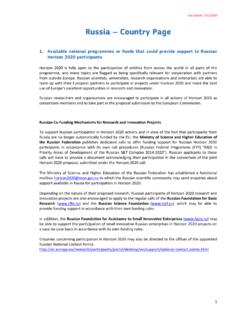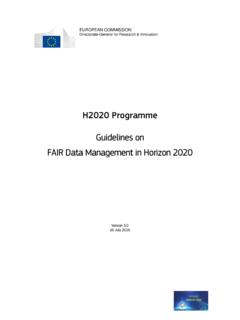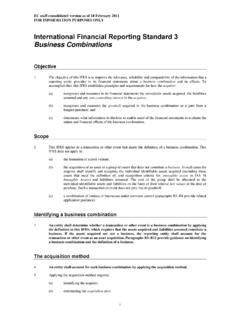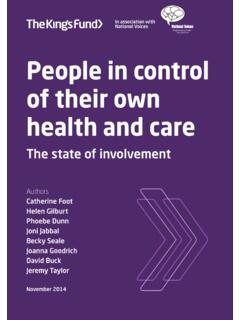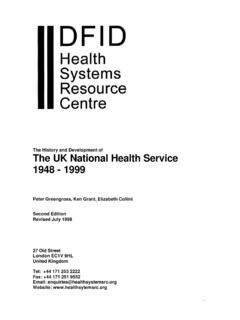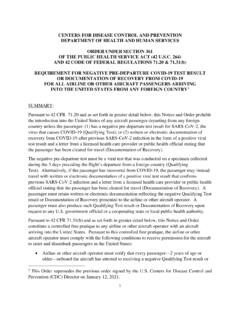Transcription of EUROPEAN CHARTER OF PATIENTS’ RIGHTS BASIS …
1 EUROPEAN CHARTER OF patients RIGHTS BASIS DOCUMENT* Rome, November 2002 PREAMBLE Despite their differences, national health systems in EUROPEAN Union countries place the same RIGHTS of patients , consumers, users, family members, weak populations and ordinary people at risk. Despite solemn declarations on the EUROPEAN Social Model (the right to universal access to health care), several constraints call the reality of this right into question. As EUROPEAN citizens, we do not accept that RIGHTS can be affirmed in theory, but then denied in practice, because of financial limits. Financial constraints, however justified, cannot legitimise denying or compromising patients RIGHTS . We do not accept that these RIGHTS can be established by law, but then left not respected, asserted in electoral programmes, but then forgotten after the arrival of a new government. The Nice CHARTER of Fundamental RIGHTS will soon be part of the new EUROPEAN constitution.
2 It is the BASIS of the declaration of the fourteen concrete patients RIGHTS currently at risk: the right to preventive measures, access, information, consent, free choice, privacy and confidentiality, respect of patients time, observance of quality standards, safety, innovation, avoidance of unnecessary suffering and pain and personalised treatment, and the right to complain and to receive compensation. These RIGHTS are also linked to several international declarations and recommendations, issued by both the WHO and the Council of Europe. They regard organisational standards and technical parameters, as well as professional patterns and behaviour. Each of the national health systems of the EU countries manifests quite different realities with respect to patients RIGHTS . Some systems may have patients RIGHTS charters, specific laws, administrative regulations, charters of services, bodies such as ombudspersons, procedures like alternative dispute resolution, etc.
3 Others may have none of these. In any case, the present CHARTER can reinforce the degree of protection of patients /citizens RIGHTS in the different national contexts, and can be a tool for the harmonisation of national health systems that favours citizens and patients RIGHTS . This is of the utmost importance, especially because of the freedom of movement within the EU and the enlargement process. * This document is the result of the work of a Cittadinanzattiva-Active Citizenship Network group composed of Giuseppe Cotturri, Stefano A. Inglese, Giovanni Moro, Charlotte Roffiaen and Consuelo Scattolon, who produced a first draft in July, 2002. The draft was discussed in Rome on 7 September, 2002. The participants in the Rome seminar were: Ekkehard Bahlo, Deutsche Gesellschaft f r Versicherte und Patienten e. V. (DGVPV); Pascale Blaes, F d ration Belge contre le Cancer; F tima Carvalho Lopes, APOVITA, Portugal; Ana Etchenique, Confederacion de Consumidores y usurarios (CECU), Spain; Ioannis Iglezakis, , Greece; Stefano A.
4 Inglese, Cittadinanzattiva / Tribunal for patients RIGHTS , Italy; Stephen A. McMahon, Irish patients Association Ltd; Giovanni Moro, Active Citizenship Network; Margrethe Nielsen, Danish Consumer Council; Teresa Petrangolini, Cittadinanzattiva, Italy; Ysbrand Poortman, Vereniging Samenwerkende Ouder- en Pati ntenorganisaties (VSOP), The Netherlands; Charlotte Roffiaen, Active Citizenship Network; Martin Rusnak, International Neurotrauma Research Organization, Austria; Bas Treffers, Nederlandse Pati nten Consumenten Federatie (NPCF); Simon Williams, The patients Association, UK. The present text has been prepared on the BASIS of this discussion. ACN also wants to thank George France for his careful review of the text. Of course, the content of the text is the exclusive responsibility of Active Citizenship Network. 2 The CHARTER is submitted for consideration by civil society, national and EU institutions, and everyone who is able to contribute, by actions and omissions, to the protection or the undermining of these RIGHTS .
5 Because of its connection to the present EUROPEAN reality, and to trends in health care, the CHARTER may be submitted to future reviews and will evolve over time. The implementation of the CHARTER shall be primarily entrusted to those active citizenship organisations working on patients RIGHTS at national level. It will also require the commitment of health care professionals, as well as managers, governments, legislatures and administrative bodies. PART ONE: FUNDAMENTAL RIGHTS EU CHARTER of Fundamental RIGHTS The CHARTER of Fundamental RIGHTS , which will represent the first brick in the EUROPEAN constitution, is the main reference point of the present CHARTER . It affirms a series of inalienable, universal RIGHTS , which EU organs and Member States cannot limit, and individuals cannot waive. These RIGHTS transcend citizenship, attaching to a person as such. They exist even when national laws do not provide for their protection; the general articulation of these RIGHTS is enough to empower persons to claim that they be translated into concrete procedures and guarantees.
6 According to Article 51, national laws will have to conform to the Nice CHARTER , but this shall not override national constitutions, which will be applied when they guarantee a higher level of protection (Article 53). In conclusion, the particular RIGHTS set forth in the Nice CHARTER are to be interpreted extensively, so that an appeal to the related general principles may cover any gaps in the individual provisions. Article 35 of the CHARTER provides for a right to health protection as the right of access to preventive health care and the right to benefit from medical treatment under the conditions established by national laws and practices . Article 35 specifies that the Union must guarantee a high level of protection of human health, meaning health as both an individual and social good, as well as health care. This formula sets a guiding standard for the national governments: do not stop at the floor of the minimum guaranteed standards but aim for the highest level, notwithstanding differences in the capacity of the various systems to provide services.
7 In addition to Article 35, the CHARTER of Fundamental RIGHTS contains many provisions that refer either directly or indirectly to patients RIGHTS , and are worth recalling: the inviolability of human dignity (article 1) and the right to life (article 2); the right to the integrity of the person (article 3); the right to security (article 6); the right to the protection of personal data (article 8); the right to non-discrimination (article 21); the right to cultural, religious and linguistic diversity (article 22); the RIGHTS of the child (article 24); the RIGHTS of the elderly (article 25); the right to fair and just working conditions (article 31); the right to social security and social assistance (article 34); the right to environmental protection (article 37); the right to consumer protection (article 38); the freedom of movement and of residence (article 45). 3 international references The fourteen RIGHTS illustrated below are also linked to other international documents and declarations, emanating in particular from the WHO and the Council of Europe.
8 As regards the WHO, the most relevant documents are the following: - The Declaration on the Promotion of patients RIGHTS in Europe, endorsed in Amsterdam in 1994; - The Ljubljana CHARTER on Reforming Health Care, endorsed in 1996; - The Jakarta Declaration on Health Promotion into the 21st Century, endorsed in 1997. As regards the Council of Europe, one must recall in particular the 1997 Convention on Human RIGHTS and Biomedicine, as well as Recommendation Rec(2000)5 for the development of institutions for citizen and patient participation in the decision-making process affecting health care. All these documents consider citizens health care RIGHTS to derive from fundamental RIGHTS and they form, therefore, part of the same process as the present CHARTER . PART TWO: FOURTEEN RIGHTS OF THE PATIENT This part proposes the proclamation of fourteen patients RIGHTS , which together seek to render the fundamental RIGHTS recalled above concrete, applicable and appropriate to the current transitory situation in the health services.
9 These RIGHTS all aim to guarantee a high level of human health protection (Article 35 of the CHARTER of Fundamental RIGHTS ), to assure the high quality of services provided by the various national health services. They must be protected throughout the entire territory of the EUROPEAN Union. With regard to the fourteen patients RIGHTS , some preliminary statements are called for: - The definition of RIGHTS implies that both citizens and health care stakeholders assume their own responsibilities. RIGHTS are indeed correlated with both duties and responsibilities. - The CHARTER applies to all individuals, recognising the fact that differences, such as age, gender, religion, socio-economic status and literacy etc., may influence individual health care needs. - The CHARTER does not intend to take sides on ethical issues. - The CHARTER defines RIGHTS as they are valid in contemporary EUROPEAN health systems.
10 It shall therefore be reviewed and modified to allow for their evolution, and the development of scientific knowledge and technology. - The fourteen RIGHTS are an embodiment of fundamental RIGHTS and, as such, they must be recognised and respected independently of financial, economic or political constraints, taking the criteria of the appropriateness of care into consideration. - Respect for these RIGHTS implies the fulfilment of both technical / organisational requirements, and behavioural/professional patterns. They therefore require a global reform of the ways national health systems operate. - Each article of the CHARTER refers to a right and defines and illustrates it, without claiming to foresee all possible situations. 4 1-Right to Preventive Measures Every individual has the right to a proper service in order to prevent illness.
